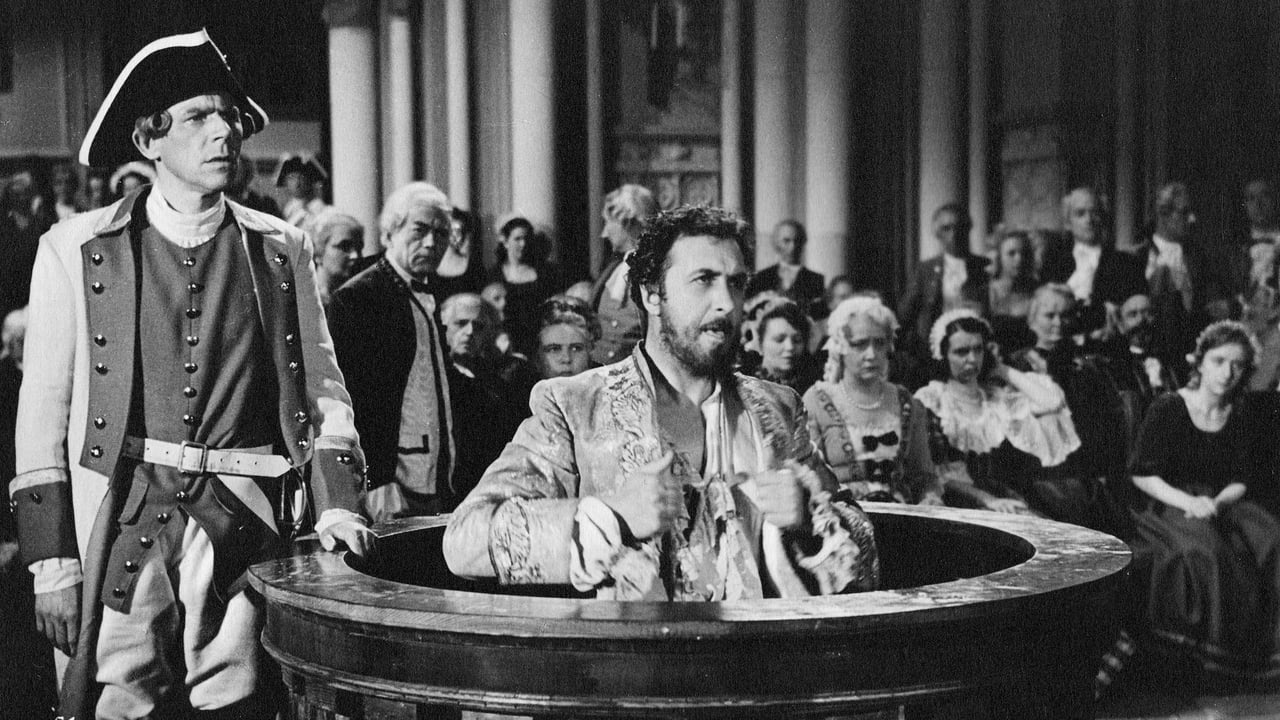kluseba
"Jud Süss" is without a doubt one of the most racist and radical propaganda movies and has been banned in several countries. Nazi propaganda minister Joseph Goebbels described the movie once as the absolute antisemitism movie. The movie is indeed filled with stereotypes and wrong historic connections and interpretations. As minus points are not possible, I would give the lowest rating to the intellectual part, the story and the message of this ugly piece of art.If we have a look on the rest, this movie is quite well acted and succeeds in his dishonourable goals as he really creates the image of a egoistic, capitalist and pitiless finance minister that brings evil over an entire population. Apart of this main character, we have many appealing secondary characters. There is the naive and beautiful young girl that sacrifices her life for her husband and the march of rebellion. Her husband is a tough and courageous man with a lot of charisma. The father of the girl is an honest, direct and sage man that seeks for justice rather than for vengeance. The decorations and costumes of the movie are detailed and luxurious. The creators of this movie put a lot of works and details into this entertaining and emotional movie. For the costumes, the filming techniques and the acting, I would normally give at least seven or even eight points.But the truth is that the propaganda of antisemitism can't be weighted up by the rest as this movie constantly focuses on this and its only purpose is to show how dangerous and evil Jewish people are. The ending of the movie even justifies the acts of the Nazi government to ban Jewish people and don't let them play any role in society.Even though the film is banned in several countries, historians still get access to this movie with certain permissions and I was able to watch this movie in order to write a dissertation about propaganda movies at the university. From a historical point of view, this movie played a very important role and is surely a stunning document of its time, society and ideology under the swastika. This movie can easily portray the lies and propaganda if you know and understand the horrible background of its creation. This movie should be considered as a warning how easily people can get manipulated by the medias and watching this flick really sharpened my senses for this topic. One should nowadays avoid this disgusting content without a doubt. On the other side, one shall not forget that this kind of films have been made and are still made nowadays in countries with radical leaders and have a shocking impact.If I sum all of this up mathematically, I might give four points to this movie even though I hate its message and wish this would have never been created to support the genocide of millions of innocent people under a reign of absolute terror and holocaust.
minamurray
Made directly for the purposes of propaganda minister Joseph Göbbels, Juden Suss is inspired by the life of Joseph Suss Oppenheimer (1698-1738), hated Jewish banker and financial planner for Duke Karl Alexander of Wurttemberg. However, because this is Nazi propaganda, greedy Oppenheimer is now also rapist, torturer, murderer and ludicrous caricature. Some of it's extremely scuzzy morality is still, sad to say, shared by many, including lot of reviewers of this movie (obese people are inhuman, disgusting and evil), but it's only reason to exist is definitely passé (namely attempt to persuade gentiles that all Jews should be tortured to death). The Jewish extras really were Jewish, slave labor forced to perform in the film, and one can only guess how they were treated. Beautiful costumes and sets, though, and those jewels which show greediness of jew and Duke are lovely.
Danusha_Goska Save Send Delete
I loved "Jud Suss," both the film and the character.Loving this movie was disturbing. "Jud Suss" was commissioned and overseen by Joseph Goebbels, Hitler's propaganda minister and Reich Plenipotentiary for Total War. The film was shown before Nazis began rounding up Jews. "Jud Suss" played a direct, horrific, role in the Holocaust. You can't talk about this film without that nightmare hovering over every word you say.I ended up writing a long essay entitled "Loving Jud Suss." The essay is now linked from my homepage. I hope interested readers will have a look and share their thoughts. I'll try to convey the gist here.First, this is a well-made, vintage, costume melodrama slash swashbuckler. If you like Golden Age, black-and-white, big budget, studio adaptations of popular novels set in the eighteenth century, chances are you could enjoy many aspects of this film: palace intrigue, fast pace, romance, period detail.I watched "Jud Suss" as if on split screens. The Nazis want the viewer to see an amoral, crafty Jew who destroys the life of a German city, Stuttgart, by introducing ballet, flirtation, and parties, by instituting a tax to improve the region's poor roads, and by allowing Jews entry to the city. I resisted what the Nazis wanted me to see. I like ballet. I live in a state with toll roads; good roads have to be paid for somehow. I don't think that allowing Jews, or any minority, out of their ghetto and into previously segregated neighborhoods is a bad thing.I could *also* see what the Nazis did not want me to see. I could see how the film lays bare the self pity, sense of personal victimization, and exaggerated view of the power of the other that is at the heart of racism and prejudice. The main German characters in "Jud Suss" are pathetic. Faber is a ninety-pound weakling and insufferable bigot. He can't even consummate a kiss, never mind a marriage, with his beloved, Dorothea. Dorothea is beautiful but simpleminded and insincere. She wants Suss but can't handle her own desire. Councilman Sturm, Rader, and Duke Karl Alexander are all obese, shouting, ineffectual old men. That Nazis held up blowhard Sturm and prissy bigot Faber as the heroes of the piece tells you how skewed – and how foreign to our modern sensibilities – was the Nazi value system.In seeing both what the Nazis wanted me to see and what they did not want me to see, I could see the absurdity and ethical and intellectual bankruptcy of Nazi ideology. That exercise made this one of the most fascinating film watching experiences I've ever had.Ferdinand Marian, as Joseph Suss-Oppenheimer, made this movie. He is on screen for almost the entire film; even when he is not, he is the super potent center of others' attention. Marian's is one of the most riveting, charismatic performances I've ever seen. I could not take my eyes off him from his first scene to the last.Off-screen events add to the unforgettable quality of Marian's performance. The story is that Marian did not want to take this role, and was so distraught when Goebbels forced him into it that he got drunk and destroyed his own apartment with an ax. Marian died in a car accident, and the rumor is that he killed himself, because of this role and its horrible history.All the principles involved in "Jud Suss" made some excuse or another to try to get out of it. Goebbels tightened the screws and forced them into it. They later claimed that they did everything they could to make Suss as sympathetic as possible under the circumstances.I read Ferdinand Marian's "Jud Suss" as an unforgettably sympathetic character. Even as I was watching the film, even as I was seeing it on a split screen, with the Nazi version on one side and my own interpretation on another, I also saw the tumultuous surrounding events. I saw the real Joseph Suss Oppenheimer, an historical figure who was tortured and executed in eighteenth-century Stuttgart. His killers kept his body on display for six years. I saw Ferdinand Marian, the actor, forced to act in a film he wanted no part of. I saw Jud Suss, the character in the movie, a lone Jew surrounded by bigoted, narrow, primitive proto-Nazis who made his, and their own lives, a misery, because they insisted that only Jews could be so perverse as to bring culture, modernity, and eroticism to a decent, clean, lifeless German city. My sympathy overflowed for Suss the character, Marian the actor, and the historical Suss-Oppenheimer. A Nazi propaganda film achieved the feat of rendering the German characters in the film universally repulsive, and the one Jewish character irresistibly sympathetic. That being the case, it's all the more tragic that Marian ended his own life over this role.Scholars emphasize the charisma and appeal of Marian's depiction. In fact, the director, Veit Harlan, reported that Marian received "baskets of love letters." It is more than a bit weird that one of the sexiest overtly Jewish characters in the history of cinema is a character in a Nazi propaganda film.

